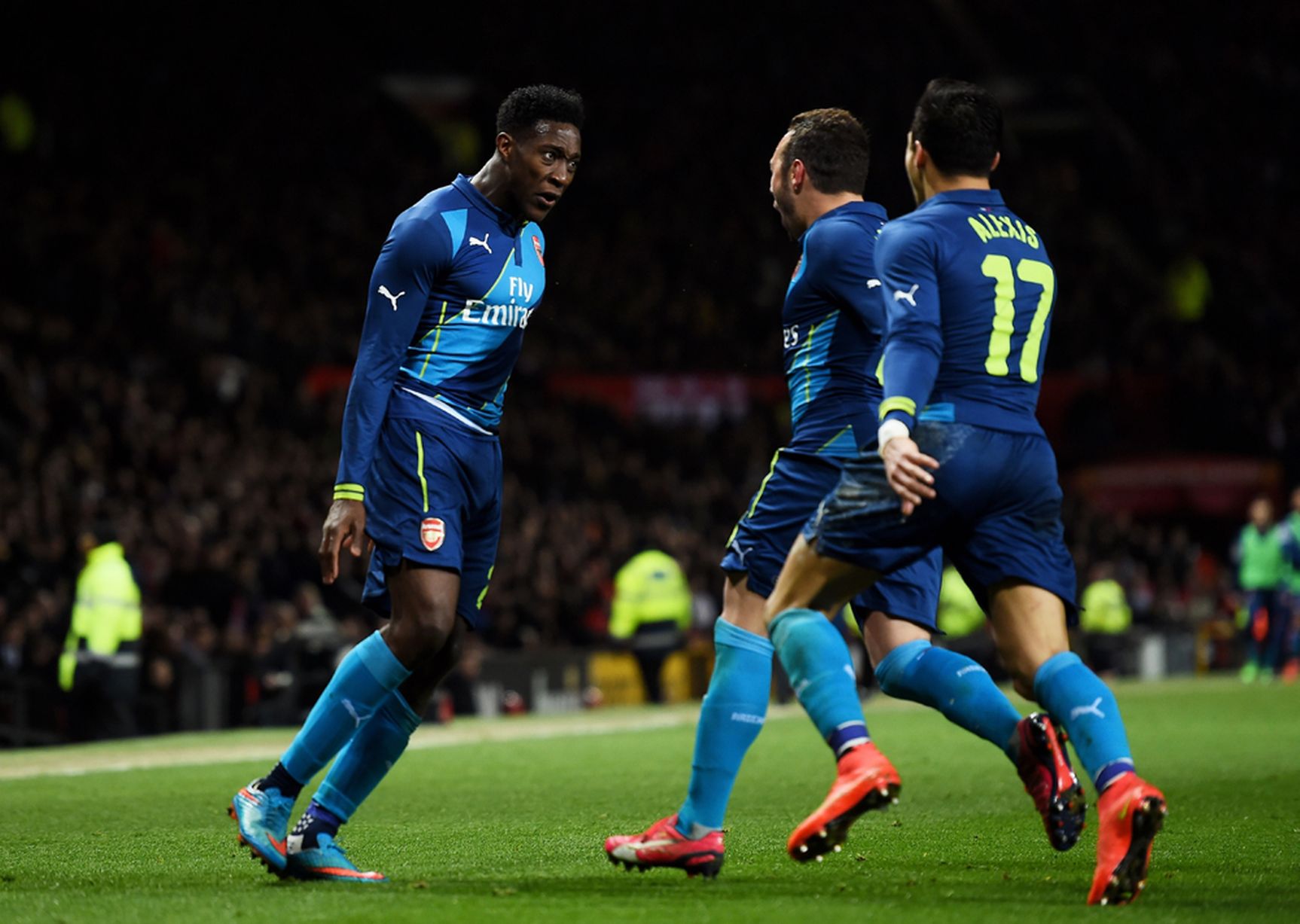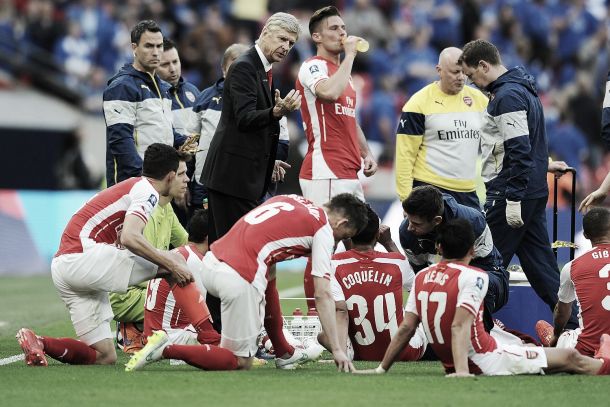On December 6th 2014, Arsène Wenger was hounded by Arsenal fans at Stoke train station and subjected to vitriolic abuse following Arsenal’s dismal first-half showing in their 3-2 defeat at the Britannia. Nevertheless, fast-forward six months and the veteran Frenchman bowed to adoring Gunners fans at Wembley, following the North Londoner's 4-0 FA Cup final victory against Aston Villa; their record 12th FA Cup, and Wenger’s sixth. Wenger is now the most successful manager in FA Cup history, what a difference a few months make.
As the season began, there was a real sense of optimism at the Emirates. The Gunners had put an end to their much-publicised nine-year trophy drought, having beaten Hull City 3-2 in dramatic fashion. Additionally, Wenger was prolific in the transfer market, bringing in five new players; most notably Alexis Sanchez from Barcelona, for £32m. Danny Welbeck, David Ospina, Calum Chambers and Mathieu Debuchy also arrived and finally Arsenal appeared to have a squad equipped to challenge for the title.
However, their season began in underwhelming fashion. Per Mertesacker, Lukas Podolski and Mesut Ozil all returned from the World Cup fatigued. This severely hampered their early season form, whilst Olivier Giroud, Debuchy and Laurent Koscielny all suffered long-term injuries. They won just two of their opening eight league games, drawing five. Their home loss against Louis van Gaal’s depleted Manchester United side in November compounded their misery and after 12 games, they had accumulated just 17 points and were languishing in eighth spot.
The Stoke defeat appeared to be the tipping point for many supporters; there had been questions raised in previous seasons about whether the Gunners would benefit from a managerial change, although these were simply gentle suggestions. However, this was rapidly progressing to insistence from some that Wenger’s Arsenal career was coming to an end. The Frenchman had an extremely tough task; he had to revive a squad devoid of form and belief, whilst also delivering instant results to appease disgruntled supporters.
Arsenal recovered well from their setback at Stoke, emphatically beating Newcastle 4-1 due to some sumptuous attacking play, before they drew 2-2 away to Liverpool, conceding a last-gasp equaliser in the 97th minute. Their season was arguably transformed at this period, by the re-emergence of Francis Coquelin, who was called back from loan at Charlton due to the Gunners’ midfield injury crisis. Nobody would have foreseen the impact the combative Frenchman would make, not even Wenger himself.
Promoting from within
Many Wenger critics claimed that Coquelin’s renaissance in an Arsenal shirt was simply good fortune for the veteran Arsenal manager, nevertheless Wenger deserves credit for calling Coquelin back from his loan spell. When enduring a difficult period, many managers have the tendency to panic and rush into the transfer market; however Wenger’s trust in his players ensures he always searches for internal solutions first.
On this occasion, his judgement has paid off handsomely. Wenger’s trust has also been vindicated by Hector Bellerin, who has been one of the Premier League’s best right-backs this season. Bellerin made his competitive first-team debut away at Borussia Dortmund, due to Debuchy’s injury and Calum Chambers’ suspension. The North Londoners were abject and Bellerin really struggled and was exposed on numerous occasions.
Many managers would have lost faith and opted for experience, but Wenger’s belief in Bellerin remained as strong as ever; he has always been an exciting attacking prospect, but he has improved the defensive aspect of his game immeasurably. Wenger deserves great credit for Bellerin’s development and, with Mathieu Debuchy fit for the start of next season, the Arsenal manager will have a major selection dilemma but it’s a healthy problem to have.
Change in tactics
One of the main criticisms levelled at Wenger over the years is his perceived lack of tactical adaptability. In the 2013/14 season, Arsenal topped the league for large proportions of the season, but they were brutally exposed away from home against top opposition after losing 6-3 to Manchester City, 5-1 to Liverpool and 6-0 to Chelsea. The players were atrocious, particularly in the latter two encounters, but the manager must ultimately accept certain culpability. The Gunners have always been an attacking-orientated team under Wenger’s stewardship, but in big matches, they have been guilty of playing with too much freedom and subsequently being ruthlessly exposed on the counter-attack.
As a consequence, it’s abundantly clear that Wenger has opted for a far more pragmatic tactical approach in the big away games this season. This was evidenced against both Liverpool and Chelsea away; unfortunately the Gunners distribution was rather inefficient and although defensively they were far stronger, they struggled to maintain a consistent attacking threat.
Nevertheless, against Manchester City, Wenger definitively proved that he remains tactically astute. The mere suggestion that a manager who has enjoyed such tremendous success and longevity is tactically naïve is ludicrous, but it remains a common misconception amongst certain fans. Coquelin was instrumental to Wenger’s tactical blueprint; the Arsenal midfield suffocated their City counterparts, denying David Silva, Jesus Navas and Sergio Aguero any space whatsoever. Whilst the Gunners pressed relentlessly, with intensity and purpose, City were ponderous and despite dominating the possession, the North Londoners were far more threatening offensively. Santi Cazorla, deployed in a deeper playmaking role by Wenger, also delivered one of the most complete midfield performances of the entire season and continues to flourish in this new-found deeper role.
The Gunners' recorded a memorable 2-0 victory and the professional nature of the display provided major encouragement to the players and fans alike. This type of performance was replicated in Arsenal’s next visit to Manchester, as the Emirates outfit knocked Manchester United out of the FA Cup, with a 2-1 quarter-final triumph.
Once again, they surrendered possession for the vast majority, utilising the width provided by Alex Oxlade-Chamberlain and Alexis Sanchez, although Wenger opted for a change of personnel up front, preferring Danny Welbeck over Olivier Giroud. Welbeck offers a pacier outlet and given the pedestrian United defence they were up against, this was an astute decision from the 65-year-old.
Welbeck was the eventual match-winner, reacting sharply to Antonio Valencia’s miscued back-pass to round David De Gea and slot the ball home. His pace unsettled Rojo and Phil Jones and offered a different outlet to that provided by Giroud. It was a clear illustration that Wenger was willing to make adaptions to his team selection based on the opposition’s strengths and weaknesses.

Arsenal were unquestionably the best team in the Premier League from Christmas onwards. This may not offer consolation to those fans that were visualising the Gunners mounting a realistic title-challenge, but it must offer encouragement and prove what they are capable of achieving with a fully-fit squad. The absences of Ozil, Walcott, Koscielny and Giroud simply cannot be under-stated. Their entire spine had been depleted; if Chelsea were missing the quartet of Terry, Matic, Hazard and Costa for a sustained period, their form would unquestionably have been affected.
Wenger has had the luxury of a selection dilemma in recent months, rather than having his hand forced by injuries. He hasn’t rotated the squad on a frequent basis, as he has been keen to retain the spine that has been so integral to Arsenal’s success since January. From April to May, Wenger named the same starting line-up for six successive matches; the first time this has happened since he arrived in North London in October 1996. For the most part, his decisions have been vindicated as the Gunners lost just one league game since February 7th.
In the FA Cup final, Wenger surprised many, as he deployed Theo Walcott in the centre-forward role as a reward for his hat-trick against West Bromwich Albion, leaving Olivier Giroud on the bench for a second successive year. Giroud has an excellent goal-scoring record against Aston Villa, so his decision was somewhat contentious. However, the gamble certainly paid off. In recent fixtures, teams had man-marked Giroud out of matches; the former Montpellier man is not blessed with great pace, so he’s been forced to play with his back to goal for large periods, which has limited the Gunners’ attacking potential.
However, against a pedestrian Aston Villa back-line, Walcott had ample opportunity to stretch the opposition and he relished the chance to roam in central areas. He was pivotal in their most dangerous attacks and was thwarted on several occasions by Shay Given and Kieran Richardson. Yet, with 40 minutes played, he grabbed his opportunity, reacting quickest to Alexis Sanchez’s knock-down, smashing his half-volley past a helpless Given. His influence simply grew as the encounter developed and it posed Villa with a completely different proposition. Arguably, Wenger didn’t receive sufficient praise for this tactical decision.
What next?
In conclusion, Arsène Wenger’s performance in 2014/15 has largely been extremely positive. He won his sixth FA Cup as Gunners boss and once again secured Champions League qualification, with Arsenal sewing up third position. Wenger has now guided Arsenal to 18 successive seasons in the Champions League, which is a tremendous feat, particularly given the financial restraints placed upon him between 2007-2013. He is often mocked for highlighting the importance of finishing in the top four, but as seen with Manchester United and Liverpool in recent years, failure to do so can have major repercussions on a club’s financial stability and more importantly, their ability to attract top-class players.
His failure to recruit another centre-back last summer could be questioned, however Arsenal entered the season with three centre-backs, the same number as Chelsea. Unfortunately, the Gunners were hampered by injuries to Koscielny and Debuchy, which forced Chambers to deputise at right-back, leaving Mertesacker to partner Nacho Monreal at centre-back for a number of months. This partnership never really blossomed; the imposing German was desperately struggling for form and was outperformed by Monreal, despite the Spaniard being deployed in a completely unconventional role.
However, the acquisition of Alexis Sanchez deserves immense praise. Sanchez has undoubtedly been one of the signings of the season and was a firm contender for player of the year. His energy, tenacity and quality is unquestionable and his influence, particularly in the first-half of the campaign, was huge. All of the summer signings have settled in well at the Emirates and they now have a squad with sufficient depth, capable of challenging for the title next season.
If they can ensure that their key-players remain fit for the vast majority of next season, they have a major chance of contending for the Premier League title. They are far stronger mentally than last season and in terms of ability, this is the best squad Wenger has assembled since their Invincibles squad. With greater tactical flexibility, coupled with a few additions in the summer, primarily a goalkeeper, defensive-midfielder and top quality centre-forward, Wenger will be confident of winning his first Premier League title for 11 years. If this were to materialise, the unanimous verdict would no doubt be ‘Wenger In’.










































